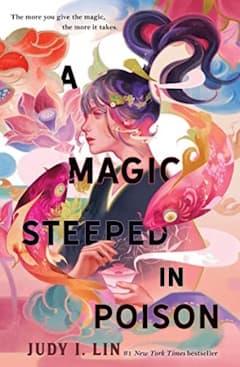
A Magic Steeped in Poison by Judy I. Lin
(Titan Books, 2022)
Reviewed by Ksenia Shcherbino
Have you ever watched a flowering tea, for example, a Lily Heart flowering tea bulb, unfurl in a glass teapot in front of your eyes? Fragrant rose and lily flowers, all perfectly tied up with premium green tea from Fujian’s famed spring harvest? This is the same feeling that you get reading Judy I. Lin’s A Magic Steeped in Poison, a finely crafted story of love, loss, palace intrigue and tea. Tea smells of all sorts infuse its pages—I swear I could taste the exotic blends that, according to the author, can make the master of the tea ceremony (or shennong-shi, masters of magic, as they are called in the book) connect to people’s hearts and read their minds. In this sense it reminded me of Becky Chambers’ A Psalm For the Wild-Built—another exploration of tea-brewing as a form of magic bringing people together. Yet while the letter is set against a post-industrial post-apocalyptic background, the Lin’s book is a spectacular mix of South-Asian mythology, wuxia and Imperial palace intrigue. And tea.
Ning, a clumsy teenager from a backward province, blames herself for unknowingly serving poisoned tea to her mother and sister. Her mother, famous tea-master, dies, trying to save her daughter, and now Ning feels that it is her duty to find a cure. She travels to the capital to join the competition of shennong-tu—apprentices of tea masters, although she has not received proper training in the ceremonial tea-making, in the hope of gaining a name for herself and money for the family. But even noble arts of tea-brewing and healing get twisted in the Imperial couloirs, especially as the future of the Empire is threatened by the illness of the Emperor and unbridled ambition of his brother, banished from the country many years ago. Ning is naïve and unskilled in plotting, and her only weapon against intrigue and betrayal is her tea magic. Harmony and dedication, honesty and humility, wisdom and compassion, those are the qualities of a shennong-shi, a true master of the art. Will she be able to save her loved ones and keep her heart pure and her path straight?
The plot might suffer from a few inconsistencies (which might be resolved in the second book), but I barely noticed it, lulled by the delicate threads of Lin’s blooming prose. The story is fast paced yet somehow light and dreamlike. It gives you a sense of complete cultural immersion, yet if you expect a retelling of a familiar story, you won’t find it. It is an infusion, not a copy, so clues and references are tantalisingly familiar yet not quite the same. There are distinct elements of xianxia and wuxia—assassins in the shadows, treacherous ministers, monasteries striving for power, a dying emperor and a succession crisis. There is romance: Ning falls in love with a mysterious boy who turns out—what a cliché!—to be the only if adopted son of the main villain. She makes friends with the weak and enemies of the mighty, and as she progresses in the competition she learns more and more about her art and about the history of her family and her true heritage. “Shennong is communion, a joining of your soul to theirs. Be vulnerable, be open…,” Ning’s mother teaches her daughters. And as a reader, I fall for it—this honesty and vulnerability that works just fine for a YA book. Just like tea, it is never overpowering or moralising. Shennong-shi don’t accept payment in coins, only in truths. And that’s how it reads—a confession, a truth, a childhood memory, a shadow puppetry show that Ning happens to see in an inn.
“Tea is a work of art and needs a master hand to bring out its noblest qualities… Each preparation of the leaves has its individuality, its special affinity with water and heat, its own method of telling a story,” writes Okakura Kakuzo in The Books of Tea. What sets A Magic Steeped in Poison apart from other books is beautiful language that grants the reader a feeling of presence, full immersion in the world. Lin is meticulous in recreating every detail of the ceremonies, tools, cups, tea sets, manuals; all ingredients are given a proper description. Her teas are a form of poetry: an osmanthus tree that once grows so big that it overshadows the moon, a dragon that shakes off the morning dew after sleeping. It is a must read for anyone who loves tea and South Asian mythology, and it ends with a cliff-hanger. Will I read the second part? You bet—I just need to order another cup of Silver Needles.
Review from BSFA Review 21 - Download your copy here.
